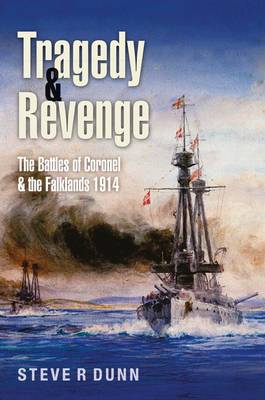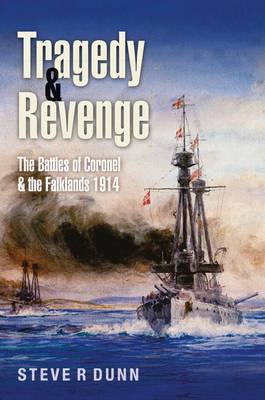
- Retrait en 2 heures
- Assortiment impressionnant
- Paiement sécurisé
- Toujours un magasin près de chez vous
- Retrait gratuit dans votre magasin Club
- 7.000.0000 titres dans notre catalogue
- Payer en toute sécurité
- Toujours un magasin près de chez vous
41,95 €
+ 83 points
Description
The Battle of Coronel on 1 November 1914, when Rear Admiral Sir Christopher Cradock and ships of his 4th Cruiser Squadron were out gunned and out matched by the German East Asiatic Squadron under Vice Admiral Maximilian Graf von Spee, was the worst British naval disaster for more 100 years; two ships, HMS Monmouth and Good Hope were lost with all hands, totalling more than 1,600 men, including Cradock. He went to his death in a forlorn hope, believing that if he could damage his opponent sufficiently to slow them down, superior forces could eventually be brought to bear.
Admiral Sir John 'Jacky' Fisher, recently returned to the Admiralty as First Sea Lord immediately despatched two battlecruisers from the Grand Fleet to exact revenge under the command of Vice Admiral Doveton Sturdee, whom he detested and half expected to fail in this mission. And indeed, Sturdee's force was surprised by von Spee's ships while coaling at the Falkland Islands, but managed to get under way and perform the task for which Fisher had designed the battlecruisers: sweeping from the seas lesser craft by virtue of superior speed and gun power. The ships of the East Asiatic Squadron was sunk or scattered and von Spee and his two sons lost their lives.
Tragedy and Revenge details both the battles and the events leading up to them, with the use of eye-witness accounts. It examines the ships which fought on both sides and points up the inferiority of the forces at Cradock's disposal, resources which Churchill insisted were fit for the task of destroying von Spee. The hopelessness felt by many of the Royal Navy participants in Cradock's little squadron is related, as is Cradock's story, alone in the Atlantic and Pacific, and his crisis of conscience whilst staying with the governor of the Falkland Islands.
The book also examines the leaders, Cradock, Churchill, Fisher, Sturdee and von Spee and the interplay of character between them. It demonstrates how Churchill's interference, and the dispositions adopted by the Admiralty while Sturdee was Chief of the War Staff, led directly to the disaster at Coronel. The book evaluates the gap between the reality on the high seas and the perception held by those at the Admiralty, especially Churchill, and how this gap helped bring about a terrible tragedy.
Admiral Sir John 'Jacky' Fisher, recently returned to the Admiralty as First Sea Lord immediately despatched two battlecruisers from the Grand Fleet to exact revenge under the command of Vice Admiral Doveton Sturdee, whom he detested and half expected to fail in this mission. And indeed, Sturdee's force was surprised by von Spee's ships while coaling at the Falkland Islands, but managed to get under way and perform the task for which Fisher had designed the battlecruisers: sweeping from the seas lesser craft by virtue of superior speed and gun power. The ships of the East Asiatic Squadron was sunk or scattered and von Spee and his two sons lost their lives.
Tragedy and Revenge details both the battles and the events leading up to them, with the use of eye-witness accounts. It examines the ships which fought on both sides and points up the inferiority of the forces at Cradock's disposal, resources which Churchill insisted were fit for the task of destroying von Spee. The hopelessness felt by many of the Royal Navy participants in Cradock's little squadron is related, as is Cradock's story, alone in the Atlantic and Pacific, and his crisis of conscience whilst staying with the governor of the Falkland Islands.
The book also examines the leaders, Cradock, Churchill, Fisher, Sturdee and von Spee and the interplay of character between them. It demonstrates how Churchill's interference, and the dispositions adopted by the Admiralty while Sturdee was Chief of the War Staff, led directly to the disaster at Coronel. The book evaluates the gap between the reality on the high seas and the perception held by those at the Admiralty, especially Churchill, and how this gap helped bring about a terrible tragedy.
Spécifications
Parties prenantes
- Auteur(s) :
- Editeur:
Contenu
- Nombre de pages :
- 320
- Langue:
- Anglais
Caractéristiques
- EAN:
- 9781036131883
- Date de parution :
- 05-02-26
- Format:
- Livre relié
- Format numérique:
- Genaaid
- Dimensions :
- 159 mm x 235 mm
- Poids :
- 878 g

Seulement chez Librairie Club
+ 83 points sur votre carte client de Librairie Club
Les avis
Nous publions uniquement les avis qui respectent les conditions requises. Consultez nos conditions pour les avis.





